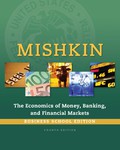
The effect of excess reserve ratio e and currency ratio c on money multiplier during the great depression year from 1930 to 1933.
- Depression years and Currency ratio
- The changes in the currency ratio can be in the determination of money supply.
- Money supply decrease due to rise in the currency ratio.
Concept introduction:
The fixed portion of deposits, the rate which is decided by the central bank, which the banks have to maintain with the Central Bank, is called the reserve ratio .
Bank crises and currency ratio: The currency ratio c rises with the onset of bank crises.
Currency ratio and money supply: Continuous bank crises and changes in money stock can be in the determinationof money supply.
Money supply decrease due to rise in the currency ratio: The relation between money supply (M the multiplier and monetary base (MB) is,
Money multiplier is the deposits to the
Want to see the full answer?
Check out a sample textbook solution
Chapter 17 Solutions
EBK THE ECONOMICS OF MONEY, BANKING AND

 Principles of Economics (12th Edition)EconomicsISBN:9780134078779Author:Karl E. Case, Ray C. Fair, Sharon E. OsterPublisher:PEARSON
Principles of Economics (12th Edition)EconomicsISBN:9780134078779Author:Karl E. Case, Ray C. Fair, Sharon E. OsterPublisher:PEARSON Engineering Economy (17th Edition)EconomicsISBN:9780134870069Author:William G. Sullivan, Elin M. Wicks, C. Patrick KoellingPublisher:PEARSON
Engineering Economy (17th Edition)EconomicsISBN:9780134870069Author:William G. Sullivan, Elin M. Wicks, C. Patrick KoellingPublisher:PEARSON Principles of Economics (MindTap Course List)EconomicsISBN:9781305585126Author:N. Gregory MankiwPublisher:Cengage Learning
Principles of Economics (MindTap Course List)EconomicsISBN:9781305585126Author:N. Gregory MankiwPublisher:Cengage Learning Managerial Economics: A Problem Solving ApproachEconomicsISBN:9781337106665Author:Luke M. Froeb, Brian T. McCann, Michael R. Ward, Mike ShorPublisher:Cengage Learning
Managerial Economics: A Problem Solving ApproachEconomicsISBN:9781337106665Author:Luke M. Froeb, Brian T. McCann, Michael R. Ward, Mike ShorPublisher:Cengage Learning Managerial Economics & Business Strategy (Mcgraw-...EconomicsISBN:9781259290619Author:Michael Baye, Jeff PrincePublisher:McGraw-Hill Education
Managerial Economics & Business Strategy (Mcgraw-...EconomicsISBN:9781259290619Author:Michael Baye, Jeff PrincePublisher:McGraw-Hill Education





